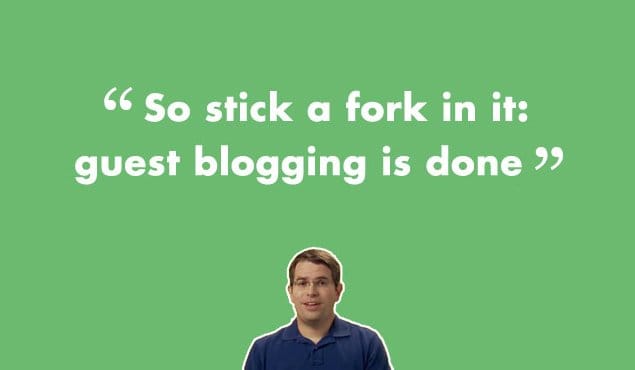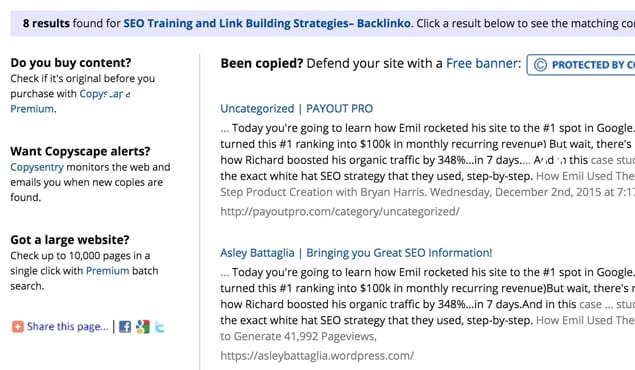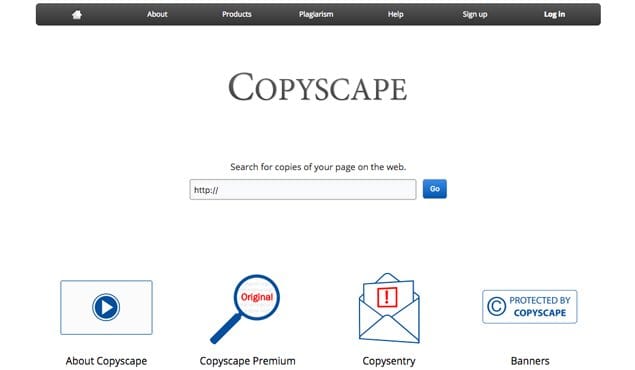An a blog author, you might be approached to accept a guest post to publish. In some cases, people just want to publish a guest post on your site. In others, they want to leverage your ability to post on another site to get their own content pushed. For example, if you write for Forbes or Entrepreneur, people who aren’t able to get their own accounts might try approaching you to see if you’ll publish their content on their behalf.
Often accompanying these solicitations is an offer of money. “Hey, I’d like to guest post on your website, and I’m willing to offer financial donations to you or an agency of your choice.” for your own site, or “Hey, as an author for Forbes, I was wondering if you could publish this for me? I can offer $X in exchange.”
There are a lot of potential issues with these offers, and I recommend that you never accept them. As nice as the money might be now, the trouble the post can bring is more than enough to outweigh it.
Google’s Perspective
Google is doing everything in its power to prevent money from directly influencing the shape of search results. There’s no way to pay Google or use a paid Google service and get a ranking boost out of it. Paying for ads won’t affect your organic SEO, beyond what happens from people who organically link to you after discovering you through a paid ad.
They can’t eliminate money completely. A big company with thousands to spend per day on advertising, on SEO agencies, on link building, and so forth, will have a lot of SEO power. A small company with $1,000 to last them an entire year might not be able to make much headway.
The truth is, though, Google makes it very much possible for those smaller sites to make progress. A small site can make headway against a large site by being more agile, approaching their industry from a unique angle, and being the first to publish something new.
Money for internet power is also something Net Neutrality is concerned with, which is why anyone who has a small business should support Net Neutrality. Unless you have the funds to pay for high tier access, you should support the ability to reach your customers.
In any case, Google doesn’t like pure influence of money on rankings, but there’s only so much they can do about it. Links are an important foundation of SEO, and so if you’re obviously buying links, Google will want them to be nofollowed, or else they can penalize you for it. They won’t catch every paid link – there’s no way for them to identify a back-room deal, really – but it’s a clause in their link schemes document. Links that aren’t editorially placed, such as links where payment is received for articles that include links that pass PageRank, are potentially subject to a penalty.
So, at the very least, you should never accept a guest post pitch that someone tries to pay for, unless they’re willing to have the link nofollowed or completely removed.
There are other possible penalties, though.
From the Blog Owner Perspective
If you’re the site owner and author, and someone approaches you and asked to guest post on your site, you need to carefully vet the offer and the content. Generally, if they’re offering money, you should turn it down. As nice as the money might be, you don’t want to hurt your site.
The fact is, if someone is paying to get their article placed on your site, they’re trying to make up for the fact that you wouldn’t normally accept it. This means that the content itself is probably terribly low quality, the kind of spammy advertorial that you won’t want on your site regardless. Even if the content is okay – and not stolen – you could find that the link is going to some thin affiliate site, a spam site, or part of a private blog network. All of those can hurt your site. Plus, if the other site is known to pay for guest posts, it means your site now is flagged as accepting paid guest posts, and it can hurt not just the link to that site, but any others you publish in the future.
From the Contributor Perspective
If you’re an author for a site you don’t own, and someone approaches you to pay to publish their content under your name, you should always turn them down. There are a lot of reasons to do so.
First of all, it’s almost guaranteed that the site itself has a terms of service document that you signed when you were added to their roster. This document almost definitely says that you will only publish your own original content, and won’t publish content produced by someone else.
In publishing content that isn’t yours, you run the risk of hurting your reputation as a writer. People will be skeptical about the quality and veracity of your content in the future, regardless of where you publish. It’s the kind of problem that can follow you for years and hurt your career. Additionally, it can hurt the reputation of the site you’re writing for.
Plus, in jeopardizing your reputation on that site and the reputation of that site, they are more likely to remove you from their roster and potentially remove all content you have published before. This can be extremely detrimental to your guest posting strategy as a whole and to your site specifically.
On top of all of this, getting your account removed for a ToS violation like that from one site can cascade into others. If Forbes removes you, and word gets out, Inc, Entrepreneur, and HuffPo could all remove you as well. You could very quickly find yourself blacklisted from all the major sites, with no recourse. What do you do then?
Then you have the trap aspect. Some sites and editors know they’re prime targets for people accepting this kind of monetary posting incentive, so they set up traps. They create side email addresses and send pitches to their writers to test them. If you accept the $500 to publish a post, the turn it around on you and reveal that you just broke their terms of service and that your account is now closed. It’s an effective way to see who is truly following the rules, and who can be bought off with money.
When to Consider a Guest Post
So for the two scenarios above, in one of them, you should never accept someone else’s content as your own. That’s a simple, 100% of the time accurate rule. Don’t pass off content you didn’t create as your own. It can come back to hurt you a lot, and for years to come.
In the other scenario, when you’re the owner of the blog and have no one to answer to but yourself, you can accept whatever content you want to publish. I say, however, that you should have some basic guidelines in place. Make sure they meet your guidelines before you publish their content, whoever they happen to be.
Guideline 1: Make sure the author has a history of producing good content.
When someone asks to guest post on your site, you should check out who they are. Look at the site they claim is theirs, and look to see if their name has shown up as the author on other posts on other sites. What kind of content do they write? Is it good? Worth reading? Is it thin and used just as a vessel for links? Is it overly commercial or self-promotional?
You’re looking to make sure the author isn’t associated with spam, either on spam sites or just producing low quality content on their own sites. You also want to make sure they aren’t linking to spam sites or sites that look irrelevant. These are signs of paid links, which can be detrimental to accept.
If the content passes the initial inspection, read it more in-depth and analyze it like you were Google. Does it stuff keywords? Is it relevant to the sites that publish it, and to your site? Is it of a sufficient length to be valuable? Short pieces can come across as thin content and aren’t very good as guest posts.
Guideline 2: Make sure any links the author includes are valid.
When linking out from your site to another site, you want to make sure you’re willing to vouch for that site. Every link you send out is a vote of confidence in the destination site. That’s how SEO works, and that’s how links work in regards to Google ranking.
Make sure the links go to good destination pages. The destination page should be a piece of good, high quality, relevant content. It should not be an affiliate link. It should not link to a homepage. It should not link to a landing page, unless it is used as an example of a landing page. It should be in context with the rest of the post, used as an expansion, example, or source.
If the author is sending a bio, make sure any links in it are valuable and viable. The post itself should only include a couple of links, and they should be valuable.
At the same time, make sure the author is willing to have their links marked as nofollow or removed entirely if you don’t approve of them. If they refuse to allow the link to be removed or nofollowed, it means they’re in it for the link, not for the reputation or the association, which means they aren’t going to be a valuable relationship. They’re going to be a one-and-done link dropper, and that’s not valuable to you or to your users.
Guideline 3: Make sure the content itself is valuable and unique.
Chances are you are not going to make a deal for content syndication. Syndication is a whole process with its own challenges, and it’s not something I recommend a small blog get into.
Read the content the user is submitting. Is it something you would feel comfortable publishing on your blog? Is it too advertorial, or too promotional? Does it speak highly of techniques or tools you don’t like or wouldn’t recommend? Is it relevant to your niche and to your industry?
Uniqueness is a hard element to quantify, but you need to approach it from two angles. From the first angle, you want to make sure the content has not been published anywhere else. If you’re publishing a guest post, you don’t want to be accused of stealing content, so run it through something like Copyscape to make sure it’s clear.
From the second angle, you want to make sure the topic is reasonably unique. You don’t want to publish a guest post on a topic that a thousand other people have covered already. You don’t gain anything. Instead, seek out posts from people with unique data or perspectives, showcasing some unique value that people will come to your site to read.
Guideline 4: Make sure the author is going to support the post once it’s published.
If the author wants to get value from your site, they need to prove that publishing on your site is valuable to you. If the post does the same or worse than your normal posts, why would you want to publish the content or more like it? It doesn’t benefit your site. You want guest posts to perform better than your standard posts, because you have the author’s audience as well as your own. Make sure the author is planning to share on their social media, link on their site, and generally promote the content they published on your site.
Above all, remember to be picky. There’s no penalty for turning down a guest post. What are they going to do, email you some more? They can’t threaten you and have no power over you. You lose out on whatever payment they try to offer, but frankly, there’s no real reason anyone should pay for a guest post slot. Just don’t do it.
 ContentPowered.com
ContentPowered.com








